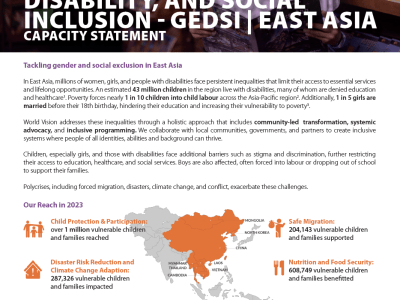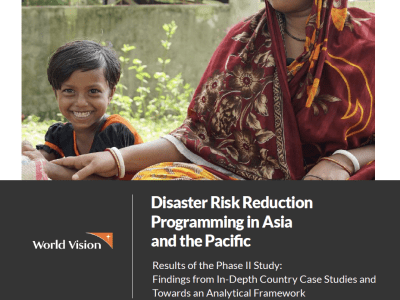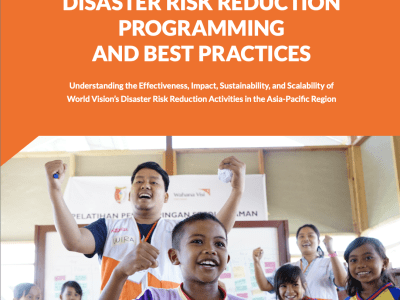publication / March 10, 2025
East Asia Capacity Statement | Gender Equality, Disability & Social Inclusion
In East Asia, millions of women, girls, and people with disabilities face persistent inequalities that limit their access to essential services and lifelong opportunities. An estimated 43 million children in the region live with disabilities, many of whom are denied education and healthcare. Poverty forces nearly 1 in 10 children into child labour across the Asia-Pacific region. Additionally, 1 in 5 girls are married before their 18th birthday, hindering their education and increasing their vulnerability to poverty.
publication / February 28, 2025
World Vision’s Call to Action for the 12th Asia Pacific Forum on Sustainable Development
World Vision’s Call to Action for the 12th Asia Pacific Forum on Sustainable Development
publication / January 27, 2025
Phase II Study: Disaster Risk Reduction Programming in Asia and the Pacific
Disaster Risk Reduction Programming in Asia and the Pacific
publication / January 21, 2025
East Asia Capacity Statement | Disaster Management
Asia-Pacific is the most climate-exposed and disaster-prone region in the world. As many as 65% of children in East Asia are exposed to multiple shocks which are becoming increasingly frequent, especially flooding, drought, saltwater inundation, and climate-related diseases. Children and families living in poverty are particularly vulnerable, bearing the brunt of these recurrent crises and their longterm consequences.
article / March 13, 2025
Elevating child participation at the 12th Asia Pacific Forum on Sustainable Development
Under the theme “Advancing sustainable, inclusive, science- and evidence-based solutions for the 2030 Agenda and its SDGs for leaving no one behind in Asia and the Pacific”, the 12th Asia Pacific Forum on Sustainable Development (APFSD) was a critical moment for assessing regional progress on the Sustainable Development Goals (SDGs). For World Vision and our partners, it was also an opportunity to highlight a crucial but often overlooked element of sustainable development—meaningful child participation.
opinion / March 29, 2025
Child participation in advocacy efforts has the power to bring meaningful change in Myanmar
"I never thought we could make a difference, but now I see how our voice can change things." - Zwae, Youth Leader, Myanmar.
article / March 6, 2025
Cambodian youth advocate uses regional stage to urge inclusive decision making
Paris was selected to join the National Children and Youth Council of Cambodia (CYC) as the youngest representative. Passionate about child nutrition and food security, he led a child/youth-led research project under the hashtag#ENOUGH campaign, aligning with hashtag#SDG3: Good Health and Well-Being.
At the 12th The @Asia-Pacific Forum on Sustainable Development (APFSD) in Bangkok, Paris shared his research findings and experiences in two key side events, advocating for inclusive solutions for child health and emphasizing the role of children in achieving the SDGs.
publication / October 17, 2024
APCSS Children & Youth Call for Action 2024
Disasters pose a substantial and growing threat to children and youth's well-being, and climate change is a rising threat to the environment and livelihood, including the survival and well-being of future generations. However, children and youth continue to be on the frontlines in combating climate change and building resilience in their communities. There have been consultative and robust research on child-centred risk reduction and school safety developed globally and in Asia-Pacific. Drawing from the findings, we highlight young people’s voices and perspectives in urging governments, DRR partners, and practitioners to undertake the following actions in line with the underlying goals of the 10th APMCDRR.
publication / February 27, 2024
A Review of DRR Programming and Best Practices in the Asia-Pacific Region
Understanding the Effectiveness, Impact, Sustainability, and Scalability of World Vision’s Disaster Risk Reduction Activities in the Asia-Pacific Region
publication / October 14, 2024
Advocates of Change: Asia Pacific Children and Youth’s Voices & Perspectives on Climate Action and Disaster Risk Reduction
This report, “Advocates for Change: Asia Pacific Children and Youth’s Voices & Perspectives on Climate Action and Disaster Risk Reduction”, is the result of the collaboration between partners from different development organizations. This project commenced in May 2024 and culminated in the launch of the report in October 2024 by the Asia Pacific Coalition for School Safety (APCSS).









